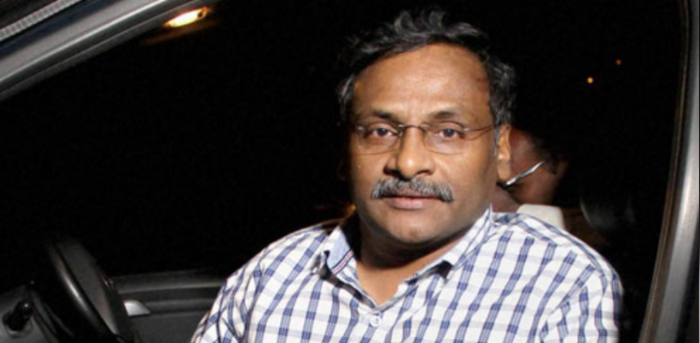
Maoist link case: SC suspends HC order to release GN Saibaba

The Supreme Court has suspended the Bombay High Court judgment of releasing Delhi University former professor GN Saibaba in the Maoist link case for want of valid sanction for prosecution under the stringent anti-terror law UAPA.
More than eight years after his arrest, the Bombay High Court on Friday (October 15) acquitted former Delhi University professor G N Saibaba in an alleged Maoist links case.
Following the HC order, the prosecution moved the Supreme Court against the acquittal.
Setting aside the life imprisonment awarded to Saibaba by the trial court, the high court noted that while the fight against terrorism was important, procedural safeguards can not be sacrificed “at the altar of perceived peril to national security.”
The 52-year-old’s lawyers had said in Mumbai that he is likely to be released from Nagpur central jail where he is lodged since his arrest in May 2014, on Saturday.
The high court’s Nagpur bench of Justices Rohit Deo and Anil Pansare in its 101-page judgement noted that the sanction to prosecute the accused under the Unlawful Activities (Prevention) Act was “bad in law and invalid”.
Saibaba who is wheelchair-bound due to 90 per cent physical disability, should be released forthwith unless his custody was required in any other case, the court said. Welcoming the ruling, his wife A S Vasantha Kumari said they had faith that he would be cleared from the case as he was innocent.
The HC also allowed the appeals filed by five other convicts, acquitting them of all charges. The HC pointed out that in 2014 when the trial court took cognisance of the charge-sheet against him and others, there was no sanction to prosecute Saibaba under the UAPA.
Also Read: HC acquits ex-DU professor GN Saibaba in Maoist links case
The trial courts proceedings were thus “null and void” in the absence of a valid sanction under the UAPA and hence the judgment of conviction was liable to be set aside, the high court held. Terrorism poses an ominous threat to national security and vile and abhorrent acts of terror do evoke collective societal anger and anguish, the judges said.
“While the war against terror must be waged by the State with unwavering resolve, and every legitimate weapon in the armoury must be deployed in the fight against terror, a civil democratic society can ill afford sacrificing the procedural safeguards legislatively provided, and which is an integral facet of the due process of law, at the altar of perceived peril to national security,” the HC said.
Speaking to PTI, Saibaba’s wife Kumari said, We had faith that he would be acquitted because he did not do anything wrong. There was no crime and no evidence. I am thankful to the judiciary and all those who supported us.
In the Supreme Court, Solicitor General Mehta mounting a spirited argument against the release of Saibaba, insisted the offence committed by him were “against the nation”.
“We have not lost on merit but for want of sanction. The matter will become infructuous as they will be released from jail, if not (the case is) urgently listed,” Mehta pleaded before the two judges.
“The accused were involved with CPI (Maoist) and the high court acquitted them. The offence committed by these persons is serious in nature and against the nation. Subsequently UAPA was invoked and the question before the high court was whether UAPA was correctly invoked or not,” Mehta said.
Mehta’s assertions notwithstanding, the apex court bench of Justices DY Chandrachud and Hima Kohli was unyielding and told told him that the court cannot stay Saibaba’s acquittal as the parties are not before it.
The bench also said it has not gone through the case file or the verdict of the high court. “You move an application before the registry for taking administrative decision on urgent listing of the matter from the Chief Justice of India,” the bench advised the Solicitor General, who appeared for Maharashtra Police.
Also Read: Ex-prof GN Saibaba, jailed over Maoist links, tests COVID-19 positive
Apart from Saibaba, the court acquitted Mahesh Kariman Tirki, Pandu Pora Narote (both farmers), Hem Keshavdatta Mishra (student) and Prashant Sanglikar (journalist), who were sentenced to life imprisonment, and Vijay Tirki (labourer) who was awarded 10 years in jail. Narote died during the pendency of the appeal.
In March 2017, a sessions court in Maharashtra’s Gadchiroli district convicted Saibaba and others, including a journalist and a Jawaharlal Nehru University (JNU) student, for alleged Maoist links and for indulging in activities amounting to waging war against the country.
The court had held Saibaba and others guilty under various provisions of the UAPA and the Indian Penal Code (IPC). Sanction to prosecute them under UAPA was granted in 2014 against the five accused, who were arrested first, and against Saibaba in 2015.
The high court bench noted in 2014, when the trial court took cognisance of the charge-sheet filed by the prosecution, there was no sanction to prosecute Saibaba under the UAPA.
Under UAPA, an independent authority is appointed to review the evidence in a case and submit a report stating if the provisions of the Act can be invoked against the accused.
Also Read: Maharashtra ATS apprehends Jharkhand Maoist leader carrying Rs 15 lakh bounty
The prosecution had alleged that the convicts were active members of the banned outfit CPI(Maoist) and its frontal organisation Revolutionary Democratic Front. The high court declared the trial court proceedings “null and void” in the absence of a valid sanction under the UAPA and quashed its judgment.
(With inputs from agencies)

